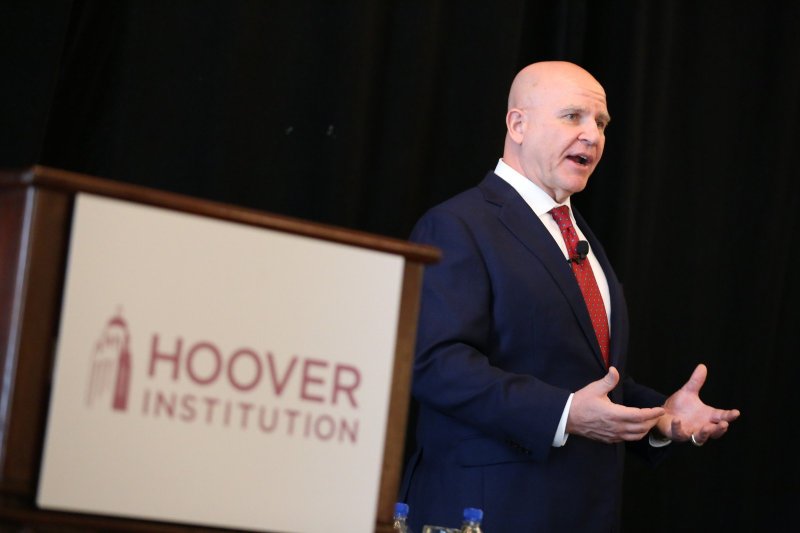Data consistency and coordination between government sectors will be vital in the next stage of the United States’ COVID-19 response, said General H. R. McMaster and student researchers during a Wednesday event hosted by the Hoover Institution.
“We have to do a better job of coordinating and integrating efforts across our government,” McMaster said. McMaster previously served as the Trump administration’s national security advisor from 2017 to 2018.
Student researchers presented a variety of ways to improve the country’s pandemic response at the event, ranging from refocusing contact tracing to centralizing data collection across states. They emphasized that a collective response — one involving the private and public sector, along with states and the national government — would be key for defeating the virus.
To reach their conclusions, panelist and U.S Civilian Corps co-founder Noah Sheinbaum MBA ’19 said the research team interviewed over a dozen practitioners, policy makers and leaders on the frontlines who have been responding to the COVID-19 pandemic, synthesizing the information into a final report.
Inconsistent data collection methods and a lack of cooperation among government sectors have made nation-wide attempts to mobilize against the COVID-19 pandemic fall short of success, the researchers said.
Researcher Ziyi Wang ’20 M.A. ’22 said the ability to adapt to changes is key when mobilizing a medical response to a pandemic.
“A successful approach to a biothreat shares early and accurate surveillance of disease spread, reliable and widespread testing, containment and contagion reducing actions, treatment of the sick and protection of the vulnerable,” Wang said.
According to Wang, the inconsistency of data collection and reporting in the United States prevented rapid mobilization against the spread of the virus. A cohesive universal strategy for widespread testing, Wang said, was not possible due to inconsistent testing capabilities, testing procedures, data collection methods and data reporting methods that vary by state.
“Such errors not only reduce the reliability and usefulness of the data collected, but also complicated cross-state comparisons necessary to monitor the spread of the virus and to surge critical supplies and medical personnel to areas of need,” Wang said.
Wang also voiced the report’s recommendation that public health agencies modernize their data reporting systems and create a defined protocol to identify and address data errors when sharing and receiving data.
Researcher Kelsi Caywood M.A. ’21 also emphasized the importance of prioritizing testing sites and expanding testing and healthcare access in high-risk communities.
The researchers praised the Department of Defense for helping mobilize such a response.
“The Department of Defense response by active duty, reserve and National Guard personnel helped prevent the medical system in hard hit areas from exceeding capacity and provided support to weary frontline healthcare providers,” said Ryan Brobst M.A. ’20.
The researchers also gave recommendations about ways to improve contact tracing.
According to Carter Clelland ’21, contact tracing can help prevent transmission of a virus — if done correctly. Issues with contact tracing in the United States partially stem from the federal system, which allows each state to conduct their own methods of contact tracing, Clelland said.
Brobst added that the team’s recommendation for contact tracing is to “pursue a strategy of decentralized contact tracing,” which involves businesses and schools engaging in contact tracing on their own as opposed to relying on public health agencies. This would increase the number of contact tracers available and the trust between individuals engaging in contact tracing and contact tracers.
Researchers also discussed the importance of partnerships between the private and public sector to promote public safety.
“We recommend leveraging the private sectors’ relationship-based networks to work across sectors and regions, avoiding forcing customers to choose between privacy and safety,” Wang said. She said this would require making scientific research exemptions more broadly available to private institutions and establishing routine public-private partnership teams in the public health sector.
In terms of ensuring personal protective equipment (PPE) is readily accessible should another pandemic occur, researcher William Healzer ’22 emphasized the need to change incentives in order to foster a market for domestic PPE production.
“The federal government should provide purchase guarantees for private domestic manufacturers of PPE for the next crisis,” Healzer said.
Researchers hope that their report will be used as a resource for congressional staffers, policy makers and government officials at both the state and local level, and for people in the private sector.
“It’s our hope that [our efforts are] going to feed forward and make it just a little bit easier to respond as this continues or the next time,” Sheinbaum said.
Contact Malaysia Atwater at matwater ‘at’ stanford.edu.
